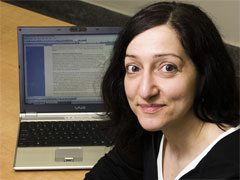Its Own Reward
By Laura Pratt
The Canadian Institutes of Health Research (CIHR) has announced the results of its September 2007 round of health research funding. In all, CIHR recognized six Sunnybrook Health Sciences Centre researchers in this competition, to the tune of more than $1.2 million:
- Dr. Peter Austin, a Sunnybrook health services researcher, cross-appointed as a senior scientist to the Institute for Clinical Evaluative Sciences, will receive $49,661 a year, for three years, for his work looking into statistical methods for health services research;
- Dr. Anna Gagliardi, a Sunnybrook Research Institute (SRI) scientist affiliated with the Centre for Health Services Sciences, will receive $67,838 a year for two years. She will try and understand how to increase the number of patients receiving services determined by research to be the best course for them by improving the way that research evidence is packaged and distributed to health professionals.
- Dr. Ayal Schaffer, an associate scientist in clinical integrative biology at SRI, will receive $36,625 a year for two years for his work distinguishing between bipolar and major depressive disorders.
- Dr. Bradley Strauss, a molecular and cellular biologist in the Schulich cardiac research program, will receive $159,100 a year for three years. He will work on developing two novel therapeutic strategies for improving guide-wire-crossing success rates in chronic total occlusions in coronary arteries.
- Dr. Cari Whyne, director of the musculoskeletal research program at SRI, and Dr. Albert Yee, an associate scientist in the musculoskeletal program, together will receive $94,966 a year, for four years, for their research on bone stability and tumour burden in the metastatic spine, wherein they'll examine the implications of variable disease patterns.
Speaking to her planned research, Gagliardi says, "It's often a multitude of factors that together create barriers [to patients receiving appropriate care]. It might be patients not understanding or requiring further information to comply with what they have been prescribed. It may be that clinicians are not aware of the most recent research evidence. A lot of the time it's institutional or even system-wide issues."
Gagliardi will apply her $135,676 award to examining how research or professional groups and government agencies make decisions about how they distribute research evidence to health professionals, how well-equipped they are and what methods they apply to do so.
In all, CIHR awarded 415 grants to researchers from the almost 1,800 applications it received, representing a $214.3-million investment in researchers across Canada.
PDF / View full media release »





